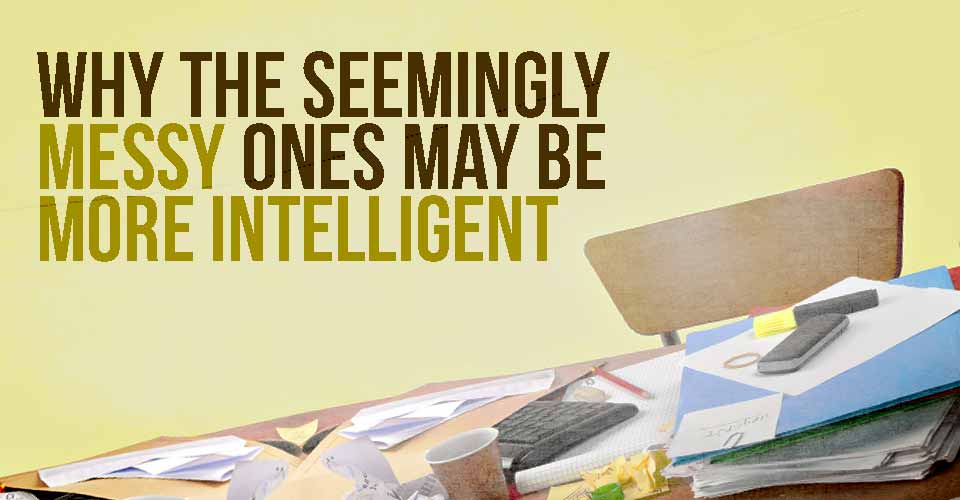Are you the slightly disorganised type?
You might not be ready to call yourself a full-on mess, but the lack of order in your life may be the result of your completely scatterbrained state of being.
You are not alone, there are loads of us out there, myself included.

My friend and I have a running joke about our ‘floordrobe’, a euphemism we invented to describe the clothes that often cover the floor or adorn the furniture in the house. Its not anything I am proud. Its a way of life I have become accustomed to, there are always piles of paper everywhere and I can never find my hairbrush quickly but I always know where the important stuff is. Perhaps like me, you have also been urged to work on this aspect of your life by the ‘tidier than thou’s? Sloppiness leads to error, they say, insisting instead that orderliness is a requirement for success.
Do you, like me clean up regularly only to find it only stays straight for about a day, if that, as you rush about, being busy doing this and that? I am never bored and after a long day I am simply not going to spend several hours cleaning and tidying the house, I’m in bed dreaming of the mess I can create tomorrow.
Ok, so things may get misplaced from time to time, but it’s never detrimental to your overall life. You are aware that your mind is everywhere, but it just sort of works for you.
Well, according to Eric Barker for Time Magazine, these scatterbrained tendencies of yours may actually determine how smart you are. Barker presents a theory that says messiness is an indicator of intelligence.
Citing Steven Johnson’s book “Where Good Ideas Come From: The Natural History Of Innovation,”the basis of the theory hinges on the idea that the busier and more cluttered the brain will lead to more potential breakthroughs and ideas.
Barker compares the creativity levels of big cities versus small towns to demonstrate this. He says, “A city that was 10 times larger than its neighbor… was 17 times more innovative. A metropolis 50 times bigger than a town was 130 times more innovative.”
According to Barker, this is because higher volumes of “ideas bouncing about” in those more crowded cities and metropolises lead to a general increase in innovation. So you can compare your brain to a crowded city or which is more innovative than a more sparsely populated village, though cowed your mind may be more prone to those kinds of innovative thoughts.
Additionally, Johnson says that engaging in multiple hobbies, like many scatterbrained people do, keeps your brain working at peak efficiency.
He explains how working on a variety of different projects at once can provoke new, more abstract styles of thought and reasoning.
Multitasking forces you to shuffle between thought processes and encourages your brain to “approach intellectual roadblocks from new angles or to borrow tools from one discipline to solve problems in another.” Instead of just zoning into one specific way of thinking.
At the end of the day, you want your thoughts to jumble around with each other. It may sound counterintuitive, but you want your ideas to “fight,” as Barker puts it.
Sounds hopeful? Let’s look at it from a different angle, I know you like to do that…
On his own personal blog, Barker references the work of Jonah Lehrer, who argues in his book “Imagine: How Creativity Works” that this so-called debating of ideas is what leads to productivity.
He writes “debate and criticism do not inhibit ideas but, rather, stimulate them relative to every other condition.” This could be a provocative finding in regard to people who are disorganized.
People often argue that the clutter of items on someone’s desk or the floor of his or her room may prevent that person from thinking clearly, Lehrer seems to think such clutter could stimulate a person creatively.
I have always been criticised by my peers about the jumble of visual ideas that surround my work space. I argue that it allows me to float off into other aspects of the thought process, and admittedly complicated things might not get done immediately, they always get completed in time and with much richer outcomes.
It’s as if disorganised people are trained to thrive in chaos, and if they harness those qualities productively all sorts of amazing things can start to happen.
I think a level of disorganisation can help you to be flexible when obstacles arise and keep you on your toes when you need to approach situations differently, not much can sway you and in the surprises and disorderliness of life you can remain calm and focussed on your objectives.
So don’t feel embarrassed or cowed anymore when people criticise your work or living space, if you are still creative and efficient in your life, celebrate it, as it might be the secret to your success.
What do you think? How do you work effectively? Join the conversation below…



